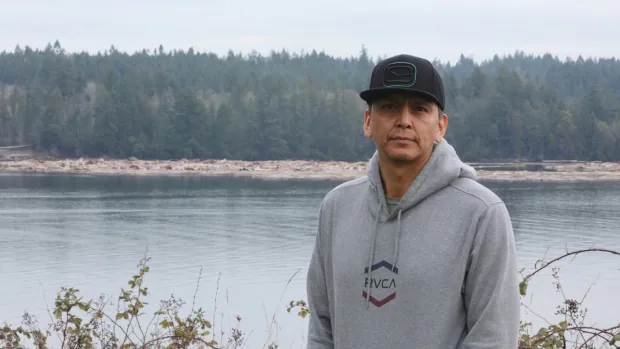This First Person column is written by Jordan Michael, Tyee Ha’wiilth (Chief) of the Nuchatlaht First Nation. For more information about CBC’s First Person stories, please see the FAQ.
This fall, over 200 years since the first Europeans visited Nuchatlaht territory, I travelled to Glasgow, Scotland to attend COP26, the eminent climate change conference in the world.
What I saw there was disappointing.
You probably haven’t heard of the Nuchatlaht. We are a small nation from the West Coast of Vancouver Island. We have lived and thrived on these lands for thousands of years.
We were here when British captain James Cook sailed into Nootka Sound in 1778. We were here when George Vancouver met the Spanish captain Bodega y Quadra in 1792.
The two European powers were fighting over ownership of our land. They obviously didn’t include us in the conversation. Our people are still on Nootka Island today and we’re having that conversation now, in B.C. Supreme Court, where we’re fighting to regain part of what was taken from us.
Nootka Island is a land of big trees and big fish, but it has become a land of clear cuts. This past summer I watched our drought-stricken cedar go thirsty and our salmon cook in the rivers as an unprecedented heat dome saw record-high temperatures. These are the things that sustained our nation.
Without cedar and salmon, Nuchatlaht culture is at risk.
It is obvious that things are not right.
I went to COP26 to talk about salmon parks. Salmon parks are watershed-based parks that protect more than the narrow strips of forest along freshwater streams. They protect the habitats that sustain young salmon, including the watersheds and forests above them. They are based on the Nuu-chah-nulth principle of hishuk ish tsawalk, meaning “everything is interconnected.”
Salmon parks recognize that from the tops of mountains to the bottoms of valleys, salmon health, river health and forest health are related.
Salmon parks are not currently widespread, but can be a key Indigenous-led tool to fight climate change by protecting one of the richest carbon sinks in the country: coastal B.C. rainforest. By keeping these forests stable and free from disturbance, we are protecting the climate and creating resilient ecosystems.
The great cedars that built this province also pull carbon out of our atmosphere. The Nuchatlaht want them to keep doing that instead of being cut down.
Our nation has proposed two watersheds in Nuchatlaht territory be turned into salmon parks. British Columbia, which is fighting us in court, will not let us govern our lands and create these parks.
We need more than lip service
COP26 was an opportunity for governments to recognize Indigenous solutions, like salmon parks. A chance to come up with an ambitious and inclusive plan to tackle climate change. Instead, the conference felt like a trade show, full of government and industry patting themselves on the back for weak solutions.
Getting into COP26 was its own challenge. The flights and lodging are expensive. If you want to rub elbows with government delegates, you need an official UN badge to access the “Blue Zone,” where speechmakers and representatives from organizations could mingle. These badges are hard to come by, requiring a lengthy accreditation process. I saw few other Indigenous folks with them.
Even with a badge, with so many voices crowding out those with fewer resources, it was a challenge to be a part of meaningful conversations. Just like 200 years ago, Indigenous voices are excluded from the conversation.
There were moments when COP26 was loud, but it never felt like Indigenous voices were heard. At least not within the Blue Zone.
Outside the Blue Zone was more inclusive, more Indigenous and more in tune to the challenges we face. I met with Indigenous peoples from around the country and world to share our struggles, hardships and solutions. Our stories are remarkably similar. Thousands of people marched in Glasgow for climate change. This felt like action.
We Nuchatlaht managed our lands sustainably for thousands of years. Our stewardship and knowledge is essential for the land to be sustained for thousands more. There is a lot that we can do, if the government will help us do it, so let us help.
Indigenous people need to have a meaningful presence at the policy table if Canada is to meet its climate targets. We need more than lip service. Reconciliation demands it.
After COP26, I returned home to more extreme weather, broken highways and flooded neighbourhoods from the devastating storms that hit B.C. in November. After a disappointing conference, it was a harsh reminder of the risks we face.
But I’m not coming home empty handed. With my resolve intact, I’m back home pushing for salmon parks, and for reconciliation.
Do you have a compelling personal story that can bring understanding or help others? We want to hear from you. Here’s more info on how to pitch to us.


